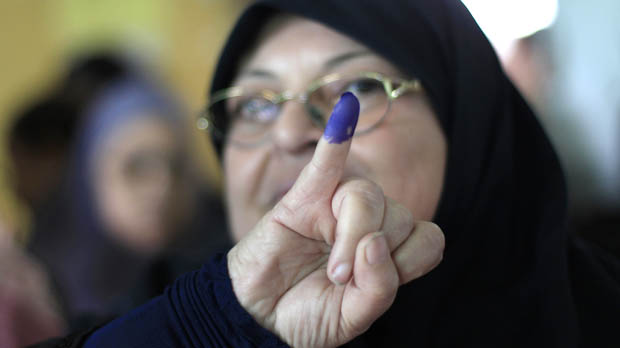Egyptians go to the polls in landmark elections
Egyptians are taking to the polls to cast their vote in the first election held since protesters in Tahrir Square and across the country ousted Hosni Mubarak in February.
In the nine months since the revolt ended Mubarak’s 30-year rule, pro-democracy protesters’ jubilation has soured, with the ruling military reluctant to cede power in favour of democratic transformation.
Indignation at the situation boiled over last week and bloody protests between pretesters and police resumed, leaving 42 dead.
In the wake of fresh scenes of violence, the army council promised civilian rule by July – much sooner than previously envisaged.
The generals had hoped to stay in power until late 2012 or early 2013.
Following the announcement, former Egyptian prime minister Kamal Ganzouri accepted the ruling generals’ request to form a new interim government.
And on the eve of Monday’s election, the head of the military council urged Egyptians to vote and warned of “dire consequences” if the nation’s political crisis continues.

“Please go and vote because we want a parliament that is well balanced from all the parties and groups. The elections will not be successful until everyone who has a right to vote participates. Egypt is at a critical crossroads. It either succeeds, or Egypt will face dire consequences,” said Field Marshal Hussein Tantawi.
Some 50 million people are eligible to take part in the election, in which the previously-banned Muslim Brotherhood is expected to perform well. Some 17 million are eligible to vote in the first two-day phase of three rounds of polling for the lower house.
The first phase of voting on Monday and Tuesday includes Cairo and Alexandria, with the staggered voting system meaning the election to the lower house will not be completed until January.
Tweets from the polling booths
@nrafea We r voting then revolting. we r proving tht the ppl of #Egypt r ready to rule themselves, and still demanding the removal of the regime
@mmabrouk it just hit me. I’ve voted. for the first time in my life, I’m a citizen, with duties, privileges & a say in my country. wow.
OK, they just said 2 lines, 1 4 women over 60. suddenly, women who’ve been 29 for 40 yrs are 60+
@msoliman7 Proud of every Egyptian who stood or continues to stand in line to vote, the future is in your ink stained hands
@cairowire Curious to see how #Saudi TV covers #Egypt elections. Men voting. Women voting. Everyone voting.
Half way through the first day of voting, there were reports in different locations of polling stations that opening late, closing early, of lack of supplies needed to carry out the voting process properly, and leafleting in contravention of the 48-hour rule.
Ahram reported that Karem Radwan, a Muslim Brotherhood official, as saying that there was a five-hour delay in the opening of 51 polling stations in two Cairo districts due to administrative employees going on strike, because they had not been given life insurance.
The National Council for Human Rights received 161 reports regarding the late openings and a number of “voting irregularities”, according to state radio
It was widely reported that many candidates – the FJP seemingly singled out on Twitter by voters – had been leafleting in Cairo stations in violation of the ban on campaigning 48 hours before polling
Voters also complained of several stations not stocking enough phosphoric ink which is used to ensure that votes have only been cast once, and others without the necessary ballot papers for the voting process to commence.
There were no reports of serious election-day violence, But scuffles among women voters occured at one Alexandria polling station that opened late because ballot papers had not arrived.